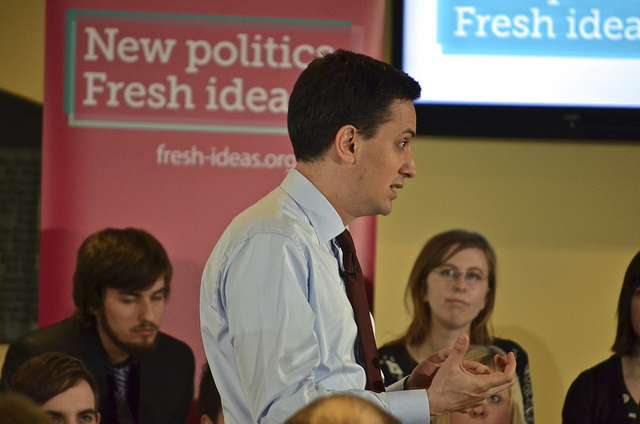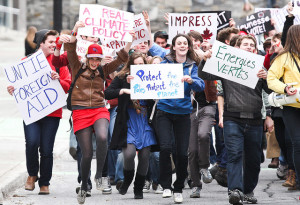Ed Miliband should recognise that 16 and 17 year olds can be part of our democracy even if they do not have the vote
Ed Miliband has recently backed a call from Democratic Audit and a range of youth organisations to lower the voting age in the UK to 16. In this post, the latest in our series on youth participation in democracy, Andy Mycock and Jonathan Tonge make the point that votes at 16 will not be a panacea to the problem of youth disengagement, and suggest we need wider reform of a political system that has become increasingly insular, self-selecting, and unrepresentative.

Ed Miliband has proposed extending the franchise age to 16 and 17 year olds. Credit: Plashing Vote, CC BY-NC-SA, 2.0
Gordon Brown established the Youth Citizenship Commission (YCC) as Prime Minister in 2008, and the Labour Party’s laudable concern with youth disengagement has continued in Opposition. In 2013, Labour established the ‘People’s Politics Inquiry’, designed to examine aspects of political culture, democratic participation and how to reconnect people to parliament, as part of an attempt to address Britain’s ‘flat-lining democracy’.
Usefully, the Inquiry does not seek refuge in denial of the challenges in reconnecting with young citizens and it supports the YCC proposition to develop alternative modes of political discussion, such as encouraging political debate and decision-making through social media. Labour’s Inquiry is not however sufficient in addressing the need to revitalise traditional forms of engagement. This is, in part, is because the development of Labour’s youth citizenship policy appears to have been pre-empted by the party’s determination to lower the voting age.
In his 2013 party conference speech, the Labour Party leader, Ed Miliband, expressed his desire to ‘give a voice’ to young people by giving the vote to 16 and 17 year olds and ‘make them part of our democracy’. Miliband’s support for lowering the voting-age was rightly grounded in a belief that voting in elections is important – a merciful rejection of over-publicised Russell Brand-esque inanities concerning a precious right for which many people died. Many citizens who get into the habit of voting early in life may well continue to do so as they get older. But while there are some serious arguments for lowering the voting age in an ageing society, it is not a panacea to issues of youth engagement and could actually prove more damaging in the long term to youth political activism.
The primary drawback with the proposition to lower the voting age is that it is a response to the symptoms of political disengagement – declining turnout – rather than the causes. Adjustment of the voting age, whatever its merits or deficiencies, will not redress the numerous issues which impair civic engagement amongst young people. The YCC final report noted that young people do not feel politicians or policy-makers take them or their concerns seriously. Political parties develop few youth-centric policies in elections that might resonate with younger voters – or fulfil such promises once in power. Young people feel elected politicians are often inaccessible to them and are poor at communicating policy in terms they are familiar. Moreover, there are few young politicians that younger voters can emphasise with and the political culture that drives local and national democracy is often perceived as infantile and insular. It is clear that democratic participation is hindered by issues of trust and efficacy of politicians and the political system.
Moreover, Miliband’s focus on possession of the vote as the key determinant of democratic citizenship would suggest that those under the legal voting age – regardless of whether it is 16 or 18 – are not part of ‘our democracy’. This is a deeply segregated approach that appears to simply seek to shift the ‘glass ceiling’ of full citizenship downwards without recognition that ages of responsibility do not coalesce around the age of 16. Proponents of ‘votes at 16’ regularly cite issues of marriage, taxation, and army service as evidence of the right to vote. Such claims are open to contention in terms of universality across the UK and overlook a wider age inconsistencies with regards to citizenship rights. Furthermore, the YCC undertook an audit of the ages of responsibility and noted successive governments had encouraged an upward trajectory. For example, young people between the ages of 16 and 18 are now compelled to continue in education or training, a state-imposed restriction not applicable to older citizens. It appears rather at odds to deny potential young voters unfettered access to the rights and freedoms of full citizenship but argue they are politically mature enough to vote.
Some proponents of ‘votes at 16’ appear to believe that structural reform in terms of voter eligibility will transform how government and political parties engage with and represent young people (see chapter four by Adonis and Tyndall). By expanding the electorate, politicians will radically alter their attitudes and actions towards young voters, encouraging a shift with regards to policy focus towards younger voters and more young people standing for election. Such optimism is laudable but speculative, based on assumptions that political elites will voluntarily reform established forms of practice and representation due to moderate expansion of the youth electoral constituency. It is not explained why political parties and politicians have typically overlooked or sought to engage with the large group of 18-24 year-old voters.
The points raised above do not preclude the possibility of lowering the voting age at some point in the future. But the enhancement of youth political engagement to encourage life-long modes of participation requires a more sophisticated review of the quality as well as the quantity of participation. Supporters of ‘votes at 16’ rightly seek to enhance our democracy but fail to acknowledge that focus on the reform of the franchise places the responsibility for decline in democratic participation squarely on the shoulders of the electorate. The detrimental impact of an under-reformed political system and culture that has become increasingly insular, self-selecting, and unrepresentative is clearly a significant contribution to political disengagement. Suggestions that young people should be compelled to vote in their first eligible elections, as recently proposed by the IPPR think-tank, similarly seek to address the symptoms not the causes of youth political disengagement.
There are lessons to be learnt from other countries where evidence suggests that lowering the voting age to 16 has little negative impact on overall turnout levels, with newly-enfranchised young voters voting in similar numbers as their older counterparts. The benefits can be short-term though. For example, the experience of Brazil suggests that disillusionment amongst 16 and 17 year-old voters can quickly set in if the political system and its actors are not prepared to reform their attitudes and behaviour. This has seen youth turnout decline, even though voting is compulsory (after the age of 18). More worryingly, evidence from Norway suggests that youth political literacy and engagement beyond elections is not significantly enhanced when the voting age is lowered. The failure to undertake reform of our political institutions, culture and policy frameworks to represent young people more proportionally before lowering the voting age could further diminish the legitimacy of elections and the wider democratic process in the UK in the long-term.
—
This post is part of a series on youth participation based on the Political Studies Association project, Beyond the Youth Citizenship Commission. For further details, please contact Dr Andy Mycock. An electronic copy of the Beyond the Youth Citizenship Commission: Young People and Politics volume can be downloaded here.
Note: This post represents the views of the author and does not give the position of the LSE or Democratic Audit. Please read our comments policy before commenting. Shortlink for this post: buff.ly/1flCjNy
—
 |
Jonathan Tonge is a Professor of Politics at the University of Liverpool. |
 |
Dr Andy Mycock is a Senior Lecturer in Politics at the University of Huddersfield. |






 Democratic Audit's core funding is provided by the Joseph Rowntree Charitable Trust. Additional funding is provided by the London School of Economics.
Democratic Audit's core funding is provided by the Joseph Rowntree Charitable Trust. Additional funding is provided by the London School of Economics.
G-SHOCK 時計
特定の状態をあなたまたはあなたの子供の健康に関する任意の心配に直面している場合常に他の医療上のノッチに沿って医師と相談する必要があります。小売業者は、ファッションの愛好家の多くの成功した選択肢です。ハンドバッグ、グッチ アクセサリー グッチを設定またはトレーナー, ように指示する必要があります記載されてどのようなアクセサリーを持っているあなたのファッションを意識の高い女性。
@jontonge argues @labourparty should recognise 16 and 17 year olds are part of our democracy even if they do not vote https://t.co/GLoILQPwvQ
@ed_miliband should recognise 16 and 17 year olds are part of our democracy even if they do not vote https://t.co/GLoILQPwvQ @electoralreform
Interessant, @Albert_Claret. RT @subirats9 Bajar la edad de votación a 16 años como elemento de debate en UK https://t.co/CgZbUfRCcs …
Bajar la edad de votación a 16 años como elemento de debate en UK https://t.co/eFXo0KpHlL
RT @democraticaudit: Ed Miliband should recognise that 16 and 17 year olds can be part of our democracy even if they do not have the vote h…
Ed Miliband should recognise that 16 and 17 year olds can be part of our democracy even if they do not have the vote https://t.co/UYArzWhxvw
Ed Miliband should recognise that 16 and 17 year olds can be part of our democracy even if they do not have the vote https://t.co/QCWBgtZjqS